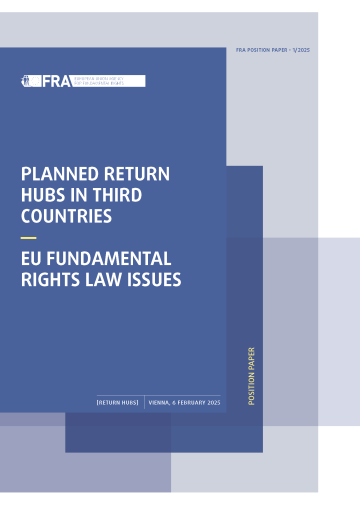Help us make the FRA website better for you!
Take part in a one-to-one session and help us improve the FRA website. It will take about 30 minutes of your time.
- An effective and independent fundamental rights monitoring system is preventative, as it reduces the risk of fundamental rights violations.
- Monitoring enhances the protection of victims of violations by strengthening the application of safeguards already in place and providing expert advice when needed. It also supports domestic investigations of allegations against public authorities by providing objective, evidence-based and unbiased analysis and reporting. This improves transparency and accountability and thus enhances trust in public authorities.
- EU law already envisages the monitoring of forced returns. Under Article 8(6) of the EU return directive, Member States must have an effective forced-return monitoring system. The EBCG regulation established the fundamental rights monitors within Frontex. Under Article 110 of the regulation, the monitors constantly assess the fundamental rights compliance of Frontex’s operational activities, provide advice and assistance, and contribute to the promotion of fundamental rights as part of European integrated border management. Article 10 of Regulation (EU) 2024/1356 and Article 43(4) of Regulation (EU) 2024/1348 require Member States to provide, by mid 2026, an independent mechanism to monitor compliance with fundamental rights during the screening of new arrivals and when assessing asylum claims at external borders. FRA developed practical guidance to assist Member States in setting up or designating such national independent monitoring mechanisms.
-
Considering the fundamental rights risks connected to the running of return hubs, FRA considers it advisable to include provisions on independent and effective human rights monitoring mechanisms in any agreement that may be concluded with third countries envisaging the establishment of return hubs. Such provisions should extend the scope of the monitoring to all phases of the process, from the transfer of the returnee to the return hub until the final removal to the country of origin. Monitoring should not only be limited to the forced return itself. National statutory human rights bodies of the Member State establishing the return hub and of the third country hosting the return hub as well as Frontex fundamental rights monitors should be involved in the monitoring, as appropriate. Relevant aspects of the practical guidance FRA developed under Article 10 of Regulation (EU) 2024/1356 and relevant UN materials [54] See, for example, Office of the United Nations High Commissioner for Human Rights, Preventing Torture – The role of national preventative mechanisms – A practical guide, Professional training series No 21, the Office of the United Nations High Commissioner for Human Rights, New York and Geneva, 2018.
can help define the scope, powers and tasks of such monitoring. Such monitoring work should be funded by the Member State making use of the return hub, using available EU funding schemes where relevant. - An additional safeguard to complement fundamental rights monitoring is the provision of complaints mechanisms. Consideration should be given to establishing these mechanisms beyond the duty under Article 111 of the EBCG regulation.
Conclusion
- In conclusion, considering the serious fundamental rights risks connected with the running of return hubs, any agreement which may be concluded with third countries envisaging the establishment of return hubs should include provisions on independent and effective human rights monitoring mechanisms.
